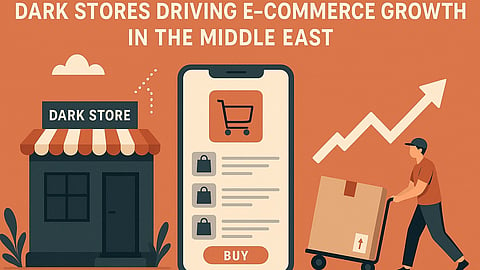Dark Stores to Power the Next Phase of MENA's e-Commerce Revolution
In the Middle East and North Africa (MENA) region, the shift to digital retail has entered a new phase. As consumer expectations for speed, convenience, and reliability intensify, dark stores and micro-fulfilment centres (MFCs) are stepping into the spotlight - quietly but powerfully enabling the next wave of growth in e-commerce.
Meeting the Demand for Instant Delivery
One of the strongest forces driving the adoption of dark stores is the rising demand for ultra-fast delivery. In dense urban hubs like Dubai, Riyadh, or Cairo, customers increasingly expect groceries, everyday essentials, and even ready meals at their doorstep within 15 to 30 minutes.
To deliver on that promise from distant central warehouses is neither cost-effective nor operationally feasible. Dark stores, small, fulfilment-only facilities located within or near residential zones, bridge that gap.
Micro-fulfilment centres, which deploy automation, robotics, and tightly optimized inventory systems, further reduce the time and error rates in picking and packing orders. These facilities can slot into existing retail footprints or be standalone nodes, enabling scalability without requiring massive new warehouses.
UAE's EMX Launches Dark Store Network
EMX, the logistics arm of 7X, unveiled a new solution designed to support the UAE’s e-Commerce landscape. EMX’s ‘Dark Store’ is a distribution facility that caters exclusively to online shopping.
Keeta’s Continued Gulf Foray: Now Disrupting Delivery in UAE?
Retailers can utilise the Dark Store as a fulfilment centre to speed up the delivery of online orders or offer their customers the option to ‘click-and-collect’ the products they have ordered online.
As part of its commitment to accelerating last-mile innovation, EMX is enabling e-commerce companies to meet growing consumer expectations, operate with greater agility, and optimise their supply chains by leveraging its vast logistics infrastructure and in-depth market knowledge.
SAL Fulfilment Services Launched in Saudi Arabia
SAL, Saudi Arabia's leading logistics and supply chain solutions provider, has launch of its Fulfilment Business Unit last year. The unit aims to be a one-stop-shop solution that will change the game for the Kingdom's logistics and supply chain industry.
With a vision to transform the logistics landscape, SAL's Fulfillment Services are designed as a one-stop-shop solution. Leveraging its strong foothold as a leading logistics company with an expansive logistics network, SAL aims to address the growing demand for integrated fulfilment services in the Saudi market.
Enhancing Cost Efficiency and Unit Economics
While speed is essential, dark stores and MFCs also help improve the cost structure of last-mile delivery. Because these nodes are placed in close proximity to high order density zones, the travel distances shrink, fuel and driver costs decline, and load factors improve. In effect, the “last mile” becomes shorter and more economical per parcel.
Automation in micro-fulfilment, from robotic retrieval to smart sorting, can boost picker productivity significantly - reducing labour costs and error rates. As labour costs rise or fluctuate, automation provides a more stable foundation for scaling operations.
Supporting High Growth and Market Scale
The MENA region’s e-commerce and quick commerce markets are growing rapidly. The MENA quick commerce segment is projected to expand at a compound annual growth rate (CAGR) of over 20% in the coming decade, with food, groceries, personal care, and ready meals leading the charge.
Globally, the dark store market is forecast to grow at a CAGR of about 36% to reach roughly US$129 billion by 2030, according to a recent report by Grand View Research.
Similarly, a report by ResearchAndMarkets.com says the micro-fulfilment centre market is expected to scale from US$6.2 billion in 2024 to US$31.6 billion by 2030, underscoring how central these assets are becoming to e-commerce strategies worldwide. In MENA specifically, the dark store market is estimated to reach US$12.1 billion by 2030, growing at a rapid clip of approximately 36% annually.
Overcoming Challenges and Risks
The model is not without hurdles. Real estate in prime urban zones is expensive, and the cost of outfitting dark stores with technology, staffing, and systems is high. These fixed costs require high throughput and densely packed demand to be justified.
Competition is intense: traditional supermarkets, large e-commerce platforms, and newer quick commerce players are all vying to offer faster delivery. In many markets, particularly in the Middle East, consumers resist paying for delivery or demand free shipping, exerting pressure on margins.
Additionally, ensuring consistent demand density, managing inventory fragmentation across many micro-nodes, and coordinating supply replenishment are operationally complex. Poor forecasting, stockouts, or imbalances between nodes can erode efficiency gains.
Strategic Imperatives for MENA Players
For e-tailers and retailers in MENA aiming to scale, dark stores and micro-fulfilment will no longer be optional, they will be foundational. Key strategic imperatives include:
Network planning and demand mapping: Use data to locate dark stores where demand clusters, ensuring high throughput per node.
Hybrid models: Combine dark stores with regional fulfilment hubs and mobile fleets to balance coverage, cost, and speed.
Tech integration: Deploy AI for demand forecasting, inventory allocation, routing, and automation of picking and sorting.
Partnership and outsourcing: Smaller players can leverage third-party operators or “fulfilment-as-a-service” providers to access dark store capacity without huge capex.
Focus on margin levers: Offer premium, high-turn items; bundle delivery; or introduce subscription models to maintain economic viability when delivering at speed.
Dark stores and micro-fulfilment centres offer the logistical muscle that MENA’s digital commerce ecosystem needs to satisfy consumers, scale sustainably, and compete in the race for instant delivery.
As the region urbanizes further and expectations rise, companies that neglect this infrastructure risk being left behind in a market where speed is quickly becoming the minimum stake for a place at the high table of logistics players.
Read More: Aramex Partners with stc Bahrain to Set Up Kingdom's First Nation-wide Smart Locker Network



